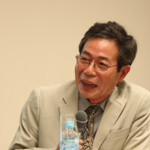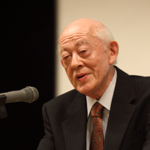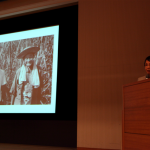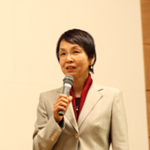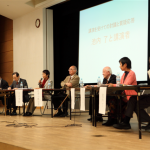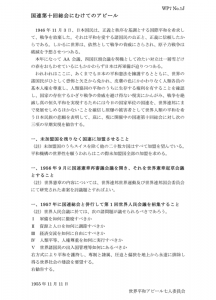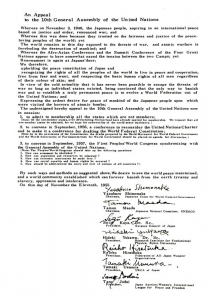Towards a World where Life is Respected
Appeal for the COP10 to the Convention on Bio-diversity
to be held in Nagoya, Japan in October 2010
6 November 2009
The Committee of Seven for the World Peace Appeal
Members: Kinhide Mushakoji, Hideo Tsuchiyama, Yoshino Oishi, Hisashi Inoue, Kayoko Ikeda, Michiji Konuma, Satoru Ikeuchi
One year before the tenth Meeting of the Conference of Parties (COP10) to the Convention on Biological Diversity (CBD), the Committee of Seven for the World Peace Appeal calls upon the United States of America to ratify this Convention and invites all the Parties to the Convention as well as all the other states of the world and all the citizens of the world to deepen their awareness about their responsibility to respect life and its diversity. In this connection, the Committee calls upon all states and citizens to consider the following points:
·The need for humankind to be aware of its power to destroy the geo-sphere and the bio-sphere:
At the final stage of the evolution of life on Earth, humankind built the noos-sphere on top of the geo-sphere and the bio-sphere, and transformed Nature making full use of its science and technology. The contemporary world community has mobilized the power of its knowledge covering a wide range of phenomena from nuclear energy to genetic information in order to extract useful services from nature. This power, on the other hand, has been developed to the extent that it can easily be misused and destroy all species living on Earth.
The Russell-Einstein Manifesto which called for the abolition of nuclear weapons and renunciation of war in 1955 was a warning against the annihilation of humankind as a species. On the occasion of COP10 to the CBD, humankind should recognize the fact that it emerged at the apex of evolution with the capacity to destroy the bio-sphere and the geo-sphere.
·The need to develop ethical and legal standards guaranteeing the “Right to Live in Peace” of all living beings.
Nowadays, international opinion demanding the abolition of nuclear weapons is gaining increasing support, however, the threat of annihilation by humankind experienced by many non-human species increases as the pressure on nature exercised by neo-liberal globalization gets stronger. It is under these circumstances that we appeal the world community to acknowledge basic principles shared by humankind with all other species, and develop ethical and legal standards for all human activities in accordance with the “Earth Charter” issued in 2000 applying to all living species the “right to live in peace” specified in the Preamble of the Constitution of Japan.
·The need to regulate intellectual activities, exercise of power, and market transactions:
It is urgently needed to develop ethical self-regulation, by the key decision-makers in global governance, the scientific and technological experts and technocrats specialized in the production of knowledge, the holders of political power, and the corporate agents who shape the economy and financial market, which must be guided by domestic and international legal constraints.
The “Earth Charter” proposes important principles and the CBD defines legally the necessary conditions of such ethical regulations, but they both do not provide their sufficient conditions which should include, among others, the ethical self-regulation based on human common-sense and their legal framework, based on the principle of prevention of possible negative consequences, of research and development of bio-technology, including genetic manipulation which can easily become the cause of the destruction of the bio-sphere if misused.
·The need to develop a cyclical market economy making the diversity of life sustainable:
Before the industrial revolution, humankind lived for several millenniums a bio-system sustaining subsistence economy. During that time the specific value and dignity of all the diverse living beings were respected and humankind produced secondary nature like “satoyama” which are hills and low mountains tied up with daily life, located near rural dwellings, receiving services from ecological resources, providing adequate return-services to the bio-sphere through a cyclical bio-system sustaining subsistence economy.
However, the Capitalist market economy developed under the leadership of Europe and North America, evolved into the contemporary global financial Capitalism making full use of the services extracted from the ecological system. The modern civilization, accompanied by industrialization and urbanization, exploited, to the extreme, the ecological system, and developed into a mass-production, mass-consumption, and mass-disposal system. The diversity of life was thus selectively exploited on the sole basis of their commercial values, and this caused the widening of rich-poor gaps among humans and threatens nowadays the very subsistence of a growing number of species.
The contemporary global financial crisis makes it clear the un-sustainability of this solely growth-oriented market economy, and this un-sustainability is confirmed by the critical issues of the bio-sphere and of the whole of the ecological system, such as the accelerated reduction of bio-diversity and global warming. It is within this global context that two third of humankind waits economic development while continuing to live in the subsistence economies.
The CBD justly includes among its objectives the fair distribution of the returns from ecological resources, beginning with genetic resources. What is necessary now for humankind is, in this connection, neither to return to subsistence economy nor simply to redistribute the returns from the commodities produced using the ecological resources turned into mere commodities. It is rather necessary to develop a process enriching mutually the respective lives of all parties through an exchange of services between humans and other living species. In brief what is necessary is the development of a new cyclical market economy making the diversity of life sustainable.
The indexes of bio-diversity should not only represent the decrease of bio-diversity. It should measure the different destructive trends of the global financial market economy on the ecosystem, and the counter-trends in the lifestyle of the citizens and the improved sustainability of bio-region economies.
·The need of transformative actions learning from traditional knowledge, innovations, and practices:
In order to develop a global market economy embed in the life-system sustaining subsistence economy, turning the global economy open to the diversity of life, it is essential, as it is mentioned in Article 8,j of the CBD, to learn from the indigenous communities and the traditional local “village” communities their knowledge, innovations, and practices, and to create, as they do, a local economy sustainable and autonomous local economy based on a mutually beneficial exchange of services between humankind and other species.
To this end, all imposition of global standards should be replaced by a patient economic reform of the local communities based on the adoption of a new ecologically healthy life-style, through awareness-building efforts in line with the Education for Sustainable Development (ESD) promoted by the United Nations.
·The need to overcome poverty and activate local economies of bio-regions:
As we saw above, the indigenous and traditional local communities have maintained their bio-system sustaining subsistence economies under the pressure of the global economy. Be it in Asia, in Africa, or in Latin America, they all maintain their traditions to live in peace with their local environments, such as the “satoyama”, be it in the rural regions, the mountains or the fishing villages. It is essential to liberate them from the homogenizing global pressures of industrialization and urbanization which affects bio-diversity in the world.
It is especially necessary to avoid that the developing regions be further affected by the speculation of the global finance which commercialize the bio-sphere resources and services and enable a small minority to monopolize the benefits obtained from them. The fair distribution of eco-system resources is indispensable in the reactivation of the bio-system sustainable subsistence economies in the developing regions which should share with the industrialized countries the same principles. These principles should be respected in all development plans, which should be developed with the full participation of the citizens of the target region, and carefully designed not to destroy the bio-system sustainability of the sustainable economy to be developed towards the elimination of poverty and the activation of the local economy.
We, the Committee of Seven for World Peace Appeal calls upon all the states and citizens of the world to develop ethical and legal standards guaranteeing the “right to live in peace” of all living species, and to integrate the market economy with the life-sustaining subsistence economies. To develop such a process of global economic reforms stopping the present trends endangering bio-diversity, should become one of the major objectives of the post-2010 road-map towards 2020.
Contact:
Michiji Konuma (member; Secretary General)
200-9 Kudencho, Sakaeku, Yokohama 247-0014 Japan
Fax: +81-(0)45-891-8386
e-mail: mkonuma254@m4.dion.ne.jp
URL: http://worldpeace7.jp
PDF Appeal→![]() 99e.pdf
99e.pdf

